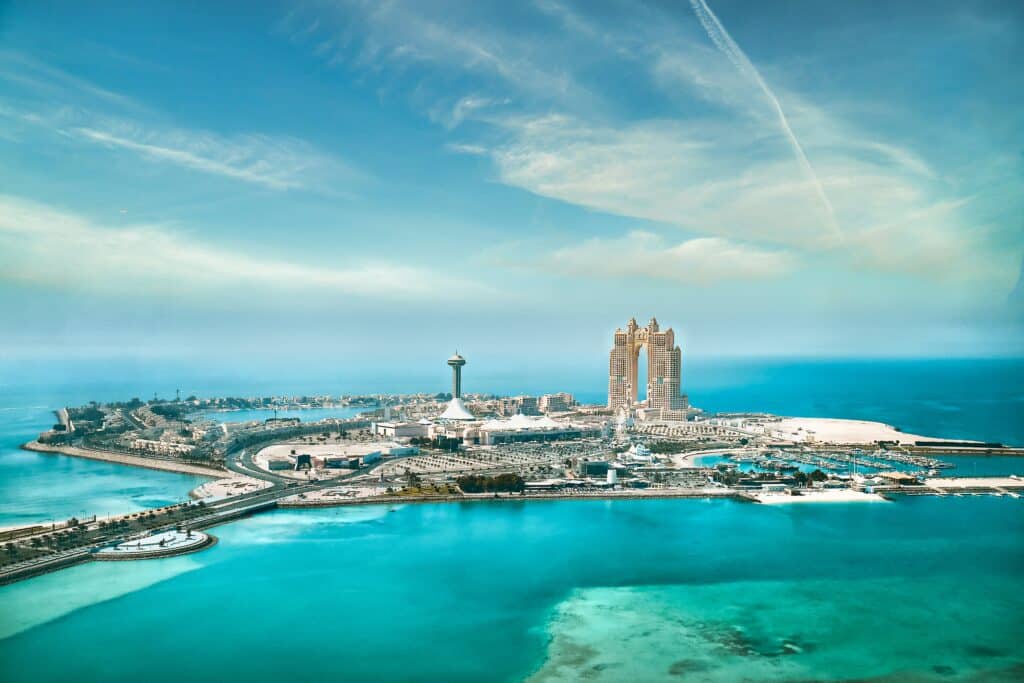Living and working in Abu Dhabi

Is Abu Dhabi a good place to work and live?
The United Arab Emirates‘ capital, Abu Dhabi, has a vibrant job market and offers professional opportunities in a number of sectors, including technology, healthcare, oil and gas and finance. Residents profit greatly from tax-free income, which enables them to maximize their earnings. Families‘ health and education are supported by top-notch medical care and international schools. A high standard of living is facilitated by contemporary infrastructure, beautiful architecture, and gorgeous surroundings. Abu Dhabi, with its ambitious ambitions and ongoing construction projects, promises a rich future, making it a desirable location for individuals seeking professional success and a cosmopolitan lifestyle in a vibrant and secure setting.
What’s the cost of living to live comfortably in Abu Dhabi?
A monthly budget of between AED 15,000 to AED 20,000 for a single individual or AED 25,000 to AED 35,000 for a family of four is normally required to live comfortably in Abu Dhabi. These costs include things like the monthly rent for a desirable apartment (between AED 5,000 and AED 8,000), utilities, groceries, a few meals out, transportation, and entertainment. Abu Dhabi offers a high level of living and first-rate healthcare and educational alternatives and costs might change depending on lifestyle preferences.
How much is healthcare in Abu Dhabi?
The is no income tax in the UAE though some countries require their citizens to pay tax on earnings abroad, with the USA being a prime example. However, a 5% sales tax is charged on all products and services. The cost of healthcare in Abu Dhabi might vary depending on the type of medical services required, the insurance level, and the amount of coverage. Basic medical costs are frequently paid by companies, which offer health insurance to their employees. However, a typical doctor’s visit without insurance may cost between AED 200 and AED 400. Specialist consultations or treatments can cost around AED 1,500 or more. Comprehensive health insurance policies provide access to a network of hospitals and clinics and normally cost between AED 2,000 and AED 6,000 per year for an individual.
What is education/school like in Abu Dhabi?
Depending on the kind of school and the grade level, the cost of education in Abu Dhabi varies greatly. Fees for primary education at foreign private schools typically vary from AED 20,000 to AED 50,000 per year. Reputable foreign schools may impose annual tuition of up to 100,000 AED or more. Public schools, while available, are usually limited to UAE citizens.
Food cost in Abu Dhabi per month
The cost of eating out on a monthly basis in Abu Dhabi varies depending on things like dining choices and family size. If they cook at home, a single individual may spend between AED 600 to AED 1,200 per month. Occasionally eating at midrange restaurants might push the monthly expense up by AED 500 to AED 1,000. The price may be higher if you frequently eat at posh establishments or favour imported specialty cuisine. Families should plan their finances accordingly, with monthly shopping costs of at least AED 2,000 to AED 4,000 depending on the size of the family and dietary choices.
Average rent in Abu Dhabi per month
Rent in Abu Dhabi varies depending on the area, kind of property, and size of the rental unit. In an upscale part of the city, a one-bedroom apartment will typically run you between AED 5,000 to AED 8,000 per month, while a three-bedroom property there may cost you between AED 10,000 and AED 18,000. Luxury flats can cost more than AED 20,000 AED per month in upmarket neighbourhoods. It’s critical to select housing that fits your budget as rental prices account for a sizable portion of the entire cost of living.
What is a good salary in Abu Dhabi for one person?
A good salary for one person in Abu Dhabi depends on their lifestyle, but as a general guideline, an annual income of AED 180,000 to AED 240,000 (AED 15,000 to AED 20,000 per month) is considered comfortable. This level of income typically covers housing expenses, healthcare, transportation and allows for discretionary spending on entertainment, dining out and savings.
How to live in Abu Dhabi permanently
Living in Abu Dhabi permanently typically involves obtaining residency. Here are the primary routes to consider:
1. Employment: By getting a job with a local business, many expatriates maintain long-term residence in Abu Dhabi. Your work visa is normally good for a few years and can be renewed as long as you stay employed. This is sponsored by your company.
2. Investor visa: By making sizeable investments in the UAE, some people may be eligible for residency. The requirements can change, but they frequently involve investing in a nearby company or buying real estate.
3. Property ownership: A residency visa can be obtained if you own property in Abu Dhabi. For precise requirements, you should verify with local authorities since the minimum property value needed varies.
4. Specialised programs: The UAE has launched a number of visa initiatives to entice talent and investors, including the Golden Visa program, which grants skilled workers, business owners, and investors long-term residency.
It’s crucial to abide by local laws, immigration rules, and visa requirements if you want to live permanently in Abu Dhabi. Depending on your situation, consulting a legal professional or the UAE’s immigration officials can offer specialized advice.
What are the disadvantages of working in Abu Dhabi?
While Abu Dhabi offers many advantages, here are some potential drawbacks to consider:
1. High cost of living: Abu Dhabi is known for its relatively high cost of living, including expensive housing, education, and healthcare.
2. Extreme climate: The city regularly receives summertime temperatures that reach 40°C. Although the winters are milder, some people may find the climate to be difficult.
3. Work-life balance: The work culture in Abu Dhabi may feature lengthy working hours and a significant emphasis on work, depending on your career and industry. For some people, finding a work-life balance might be difficult.
Although these drawbacks do exist, living in Abu Dhabi offers benefits like job prospects, a high standard of life, and a thriving expat community that far exceeds these difficulties.
Living in Abu Dhabi as a woman
Living in Abu Dhabi as a woman can be a positive experience, but it’s important to be aware of and respect the cultural norms and laws in the United Arab Emirates (UAE). Here are some considerations for women living in Abu Dhabi:
1. Dress code: UAE has a modest dress code in most public places where women are expected to dress conservatively. While expatriates have some leeway in this regard, it’s respectful to adhere to local customs, especially in more conservative areas.
2. Safety: Abu Dhabi is generally considered a safe city for women. The UAE has low crime rates, and women feel safe to be alone. However, it’s still important to take precautions and be aware of your surroundings.
4. Support networks: To interact and exchange experiences, many foreign-born women in Abu Dhabi join support networks and social clubs.
Being a woman in Abu Dhabi can be beneficial, but it’s important to create a balance between one’s cultural ideals and the local laws and practices. By doing this, women may lead full lives in this vibrant and multicultural city while still honouring its customs and culture.
What are the most common jobs in Abu Dhabi?
Some of the most common and sought-after jobs in Abu Dhabi include:
1. Finance and banking: The city is home to many financial institutions, which makes it a centre for those who work in banking, investments, and financial services.
2. Construction and engineering: As a result of continuous infrastructure development and urban expansion initiatives, the construction and engineering sectors are booming.
3. Information technology: Abu Dhabi is making investments in innovation and technology, which is increasing demand for IT specialists, such as software developers, cybersecurity specialists, and data analysts.
4. Tourism and hospitality: Abu Dhabi’s tourist sector is expanding and adding positions in hotels, restaurants, travel agents, and related businesses.
5. Aerospace and aviation: As aerospace and aviation projects advance, opportunities for engineers, pilots, and those working in the aviation industry will arise.
6. Legal and consultancy services: There is demand for legal professionals, consultants, and advisors, especially in areas like corporate law and business consulting.
7. Real estate: Property management, sales, and leasing options are available in the real estate sector.
It’s crucial to remember that economic conditions and governmental actions might have an impact on the employment situation. To identify the best chances, expatriates looking for work in Abu Dhabi can research businesses, go through job postings, and think about networking. Although English is frequently used in business and daily life, understanding Arabic can be useful in a variety of fields.

What are some good places to live in Abu Dhabi?
Abu Dhabi has a number of desirable neighbourhoods, including:
1. Al Reem Island: Popular for its contemporary residences and beachfront living, Al Reem Island provides a modern way of life with a wide range of services, dining options, and retail establishments.
2. Al Raha Beach: This waterfront neighbourhood features a mix of flats and villas, a laid-back environment, access to the beach, and close proximity to retail malls and schools.
3. Saadiyat Island: In addition to the Saadiyat Beach Golf Club and the Louvre Abu Dhabi, Saadiyat Island is home to premium residential developments and stunning beaches.
4. Khalidiya: A well-established neighbourhood with a mix of flats and villas that are close to parks, stores, and restaurants. It is situated in the heart of the city.
5. Corniche Area: The Corniche features a variety of apartment buildings and breathtaking views of the water. It is renowned for its energetic environment and convenient location near cultural attractions, parks, and beaches.
6. Mangrove Village: This is a gated neighbourhood on Reem Island that offers villas and townhouses with top-notch amenities and a family-friendly setting.
7. Mohammed Bin Zayed City: This outlying community is well-liked by expatriates since it provides affordable housing alternatives in the form of apartments and villas.
8. Masdar City: A sustainable and environmentally friendly development, Masdar City offers a distinctive way of life with cutting-edge housing and green technologies.
Consider your budget, distance from work and school, chosen lifestyle, and the amenities that are most important to you when choosing a location to live in Abu Dhabi. To locate the best fit for your needs, it’s also a good idea to explore areas and talk to real estate professionals. It’s a good idea to start your search well before you want to move because the rental market in Abu Dhabi can be fiercely competitive.

Best area to live in Abu Dhabi for couples
Al Reem Island in Abu Dhabi is a well-liked destination for couples. It offers contemporary and exciting urban living with one-bedroom apartment rent ranging from AED 70,000 to AED 150,000 annually. The island offers a wide range of attractions, including restaurants, malls, waterfront vistas, and recreational facilities. The city centre and other tourist sites are close by and easily accessible from this location. Saadiyat Island and Al Raha Beach provide peaceful possibilities, but Al Reem Island’s cosmopolitan vibe and variety of housing options make it an alluring choice for couples looking for an exciting yet cosy way to live in Abu Dhabi.
Best area to live in Abu Dhabi for singles
The Corniche neighbourhood is a favoured choice for singles in Abu Dhabi. One-bedroom apartment rents normally cost between AED 80,000 and AED 120,000 per year. In addition to a range of culinary establishments, this thriving waterfront neighbourhood provides quick access to parks and cultural attractions. It’s perfect for people who want a vibrant social life and easy access to nightlife. Al Reem Island is another well-liked option, appealing to the young and single audience with its contemporary apartments and services. Singles in Abu Dhabi can enjoy an exciting urban lifestyle in either neighbourhood.
Affordable places to live in Abu Dhabi
For those on a tight budget, Abu Dhabi has various cheap neighbourhoods. With its variety of housing alternatives, including apartments and villas priced between AED 35,000 and AED 70,000 annually, Mohammed Bin Zayed City is a preferred pick. Another low-cost neighbourhood is Mussafah, which is distinguished by its industrial area and reduced cost of living. One-bedroom flats there normally cost between AED 30,000 and AED 50,000 annually. One-bedroom flats in Khalifa City, particularly Khalifa City B, are reasonably affordable, costing between AED 40,000 and AED 60,000 annually on average. While still providing necessary services and easy access to the city centre, some locations provide more affordable housing options.
Best place for family in Abu Dhabi
Al Raha Beach is frequently regarded as one of the nicest residential districts in Abu Dhabi for families. With rental rates for roomy flats and villas ranging from AED 100,000 to AED 250,000 yearly, it provides a tranquil beach lifestyle. Excellent schools, a welcoming atmosphere for families, and easy access to commercial areas are all features of Al Raha Beach. Families also like Khalifa City, especially Khalifa City A and B, for its family-friendly housing options, which range from AED 60,000 to AED 130,000 yearly. Families in Abu Dhabi can live in one of these places in a secure setting with close proximity to educational institutions.
In conclusion
Both locals and visitors may enjoy a vibrant and active lifestyle in Abu Dhabi. It is a desirable location for anyone wishing to live and work in the Middle East because of its thriving economy, first-rate infrastructure, and diversified cultural environment.
If you’re considering relocating to Abu Dhabi or need assistance in building out your team, our team is here to help. With our extensive knowledge and experience in the local market, we can provide valuable support and guidance throughout the relocation and recruitment process. Contact the team today to make your transition to Abu Dhabi a seamless and successful one.



